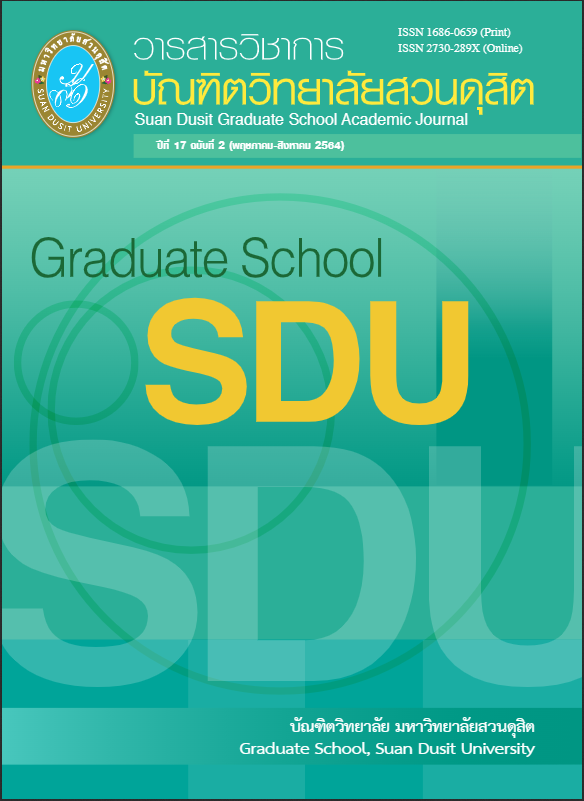Intellectual conflict and the project to improve the professional qualifications of teachers Prof. 2017 Case study of graduate education course SWU.
Keywords:
Cognitive Dissonance, English Language Teaching, Education Program, Teacher EducationAbstract
Teacher education was one of the most essential components in an educational system. However, it seemed that effort to equip teachers with knowledge and skills for the Thai teaching profession had been loosened lately. This was applied research which examined cognitive dissonance of English teacher students as well as teachers responsible for the education programs at Srinakharinwirot University (SWU) with regards to the new teacher qualification scheme in Thailand as of 2017 that reduced the former five-year education programs to four. The sampling group comprised 62 students of the Bachelor of Education Program in English at SWU based on purposive sampling. The research instrument was the cognitive dissonance questionnaire which was validated by three experts. Semi-structured interviews were conducted on three responsible teachers of the program. The findings through descriptive statistics indicated that students demonstrated cognitive dissonance against some aspects of the revised teacher qualification scheme 2017 reporting 45.2% on insecurity about future employment, 30.6% on despair of benefits of their current degree, 74.2% demanding action against the new scheme, 77.4% protection from the new scheme and 56.5% unfairness of the new scheme. The interview results by teachers responsible for an education program indicated uncertainty in relation to future employment competitiveness and stability of remaining students of the five-year program.
References
หนังสือพิมพ์ไทยรัฐ. (2560) ค้านสอบครูไม่มีใบวิชาชีพ ขอรัฐบาลทบทวน ยันขัดข้อกฎหมาย. [Online]. Available: https://www.thairath.co.th/newspaper/897662 [2560, มีนาคม 28].
Anderson, L.W. & Krathwohl, D.R. (2001). A Taxonomy for Teaching, Learning, and assessing: A Revision of Bloom's Taxonomy of Educational Objectives. New York: Longman.
Ajzen, I., & Fishbein, M. (1980). Understanding Attitudes and Predicting Social Behaviour. Englewood Cliffs: Prentice Hall.
Bandura, A. (1997). Self-efficacy Theory: Toward a Unifying Theory of Behavioural Change. Psychological Review. 84: 191-215.
Boonpen, K. & Aramnet, C. (2017). Rule on Recruiting Unlicensed Teachers Changed After Outcry. The Nation. [Online]. Available: http://www.nationmultimedia.com/detail/national/30310599 [2019, March 1].
Brown, D. & Lee, H. (2015). Teaching by Principles. An Interactive Approach to Language Pedagogy (4th ed). New York: Pearson Education.
Darling-Hammond, L. & Bransford, J. (2005). Preparing Teachers for a Changing World: What Teachers Should Learn and be Able to do. San Francisco: Jossey-Bass.
Faikhamta, C., Ketsing, J., Tanak, A. & Chamrat, S. (2018). Science Teacher Education in Thailand: a Challenging Journey. Asia-Pacific Science Education. [Online]. Available: https://doi.org/10.1186/541029-018-0021-8 [2019, May, 1].
Festinger, L. (1957). A Theory of Cognitive Dissonance. Evanston: Row & Peterson.
Mala, D. (2017, March 29). Government Rethinks Softer Teacher Entry Rules. The Bangkok Post. [Online]. Available: https://www.bangkokpost.com/archive/government-rethinks-softer-teacher-entry-rules/1222860 [2019, May 1].
Nation, I. S. P. & Macalister, J. (2010). Language Curriculum Design. New York: Routledge.
Office of the National Education Commission. (2015). State of Teacher Education and Professional Development in Thailand. Bangkok: ONEC.
Payne, D. A. (2003). Applied Educational Assessment (2nd ed.). California: Nelson Thomson Learning.
Rubin, H. & Rubin, I. (2005). Qualitative Interviewing: The Art of Hearing Data (2 ed.). California: Sage.
Schwille, 1. Dembele, M. & Shubert, J. (2007). Global Perspectives on Teacher Learning: Improving policy and Practice. Paris: International Institute for Educational Planning.
The Guardians. (2017) Teaching is Ruining my Life, But I don't Know What to do Instead. [Online]. Available: https://www.theguardian.com/careers/2017/oct/23/teaching-is-ruining-my-life-but-i-dont-know-what-to-do-instead [2019, May 10].
Tellez, K. & Waxman, H. (2006). Preparing Quality Teachers for English Language Learners: An Overview of the Critical Issues. Mahwah: Lawrence Earlbaum Associates.
Downloads
Published
How to Cite
Issue
Section
License
Copyright (c) 2021 Suan Dusit Graduate School Acadamic Journal

This work is licensed under a Creative Commons Attribution-NonCommercial-NoDerivatives 4.0 International License.






